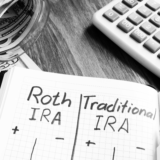The tax code permits you to convert some or all of your Traditional IRA to a Roth IRA regardless of your age or income. You pay ordinary income tax on the converted value of deductible contributions and earnings. After five years of Roth ownership and reaching age 59 ½ you may then be able to benefit from tax-free withdrawals of earnings from the Roth for all of retirement. In addition, Roth IRAs have no required distributions (RMDs). If you don’t need to access the Roth for living expenses, the earnings can continue to compound tax-free.
IS IT WORTH PAYING TAX ON THE CONVERTED FUNDS?
Because you pay income tax at your current rate at the time of conversion, you are able to lock in the tax liability on your retirement savings at a known cost. This could be particularly advantageous if you believe today’s income-tax rates will increase, or if your personal situation suggests your tax liability will be higher in retirement than today. Creating a Roth via conversion can also be a powerful move to pass wealth on to the next generation, especially if your heirs are likely to be in a higher tax bracket than yourself. Inherited Roths do have required minimum distributions for beneficiaries, but the RMDs are generally income tax-free.
WHAT ARE THE DOWNSIDES?
Once completed, a conversion cannot be reversed. Prior law allowed recharacterization, effectively a free do-over if the conversion created more taxable income than intended. The ability to reverse a conversion was lost with tax reform. There is also a risk that a conversion could push you into a higher bracket, which in turn could result in other costs such as the net investment income tax, phase-out of credits, or higher Medicare premiums. For the conversion to create the greatest tax-free compounding opportunity, you ideally want to pay the income tax liability from money that is not in your IRA. This means you need to have dollars available in non-retirement accounts to pay the tax.
WHY NOT CONVERT THE ENTIRE IRA?
A series of partial IRA to Roth conversions may help limit added tax that a large conversion can cause by creeping into a higher bracket. If you have charitable interests, you may want to retain IRA money to use the Qualified Charitable Distribution (QCD) rule. Used properly, the QCD can satisfy a required minimum distribution and permit tax-free transfers from an IRA to a charity. However, the QCD is only available to individuals who are age 70 ½ or older.
HOW CAN I THINK STRATEGICALLY ABOUT CONVERSIONS?
A conversion in a year with a large bonus, taxable home sale or strong portfolio returns is likely not ideal timing, due to the tax cost. There are situations to consider that could lower the tax on conversion and meet multiple planning objectives simultaneously:
• Convert when your income is down, for example, if you are transitioning between jobs or have loss activity
• Complete large charitable gifts the same year as conversion; for the charitable deduction to help offset the taxable income from the conversion
• Convert in the years post-retirement before commencing Social Security benefits or RMDs
• If you have non-deductible IRAs, determine if some or all of your conversion may be tax-free conversion of basis
SUMMARY
In summary, it may be difficult to get excited about paying taxes now on a conversion, especially if the benefits won’t be realized for many years. It is more important now than in prior years to consider the impact, due to the repeal of recharacterization. The strategy merits consideration for those willing and able to think about the variables with their financial and tax advisor. Converting can provide real advantages, from paying tax at today’s rates rather than unknown rates later, more flexibility from no required distributions, and income tax-free growth to pass on to heirs. Please consult your tax and financial advisors for more information.



